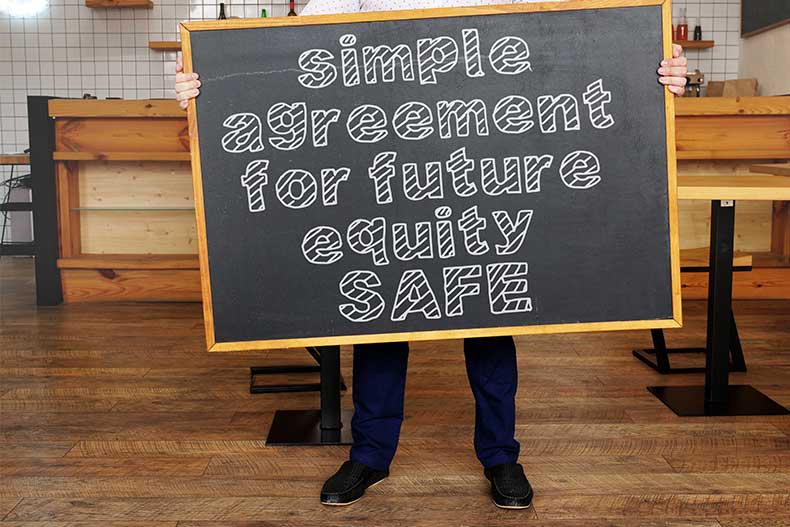SAFE or simple agreement for future equity works as a warrant since it’s an option to purchase equity later based on the terms the agreement defined. In 2013, Y Combinator pioneered SAFEs as a convertible debt alternative. Convertible debt was widely used at that time, but SAFEs are typically a lower-cost and faster way to facilitate investment. SAFEs are, thus, attractive to venture capital firms, angels, and startups.

How SAFEs Work
There are some terms in most simple agreements for future equity that you should familiarize yourself with before getting into the details why you should have one. They are the following:
- Qualifying Raise – For the SAFE to trigger and convert to equity, there’s usually a minimum amount to raise. That means it wouldn’t be triggered to convert if the startup has only raised an amount that’s lower than the minimum.
- Valuation Cap – More commonly known as cap, it’s the maximum valuation that the investor will be valued at if the SAFE already converts to equity.
- Discount – This refers to the discount that the venture capital firm, angel, or startup could get at the next financing round’s valuation.
SAFE notes don’t require filling with the government or a regulator. They’re relatively short documents that can be examined quickly.
When using a SAFE, the startup valuation will be determined in a later financing round once the SAFE converts to equity. That’s why the valuation is usually variable.
Depending on future financing round, which is usually by an institutional investor, the investor and the founders agree on a specific formula to be used in determining the valuation that the investment comes in at.
Benefits Of SAFE Notes
SAFE notes were developed by Y Combinator in response to difficulties experienced from convertible note agreements. Although they’re still used, convertible notes were considered as the predecessors to simple agreements for future equity. SAFEs, however, have several advantages over convertible notes.
The benefits that SAFE notes provide include the following:
-
Includes Essential Agreements
Convertible notes are still useful despite having some negatives. They have useful parts, and SAFEs include many of them. Important stipulations regarding valuation caps, change of control, early exits by both investors and founders, company dissolution, and any future bankruptcy event were all adopted from convertible notes to SAFE notes.
-
Simplicity
SAFE notes are five-page documents that have no interest or end date. They’re simpler than convertible notes. They’ll usually be straightforward, that’s why anyone may be able to understand and even draft one without help from a lawyer.
Also, SAFE notes free up the time of investors while helping the company move at a faster rate with less bureaucracy. That’s because investors aren’t required to sign off on the decisions of the company or attend shareholder meetings. For early-stage startups, it’s going to be a big advantage, especially for those with limited resources to succeed.
-
Straightforward Accounting
SAFE notes are included in the capitalization table for your company’s accounts, which is similar to any other type of convertible security. That’s why you won’t experience tricky tax consequences when using SAFEs.
-
Fewer Things To Negotiate
SAFEs don’t require many negotiations, unlike other investments. The founder and investor may sometimes talk about valuation caps, but that’s all.
-
Availability Of The Option For Equity Conversion
Even if equity conversion isn’t set in stone, like how it works in a convertible note, investors still have the option to convert the investment into equity later. During subsequent investment rounds, when more investors become involved, the startup founders and the investor will agree on the time for doing equity conversion.
-
Flexibility
Since there’s no need for valuation, SAFEs give startups so much freedom. SAFE notes also give you peace of mind because of not having repayment obligations and a maturity date. That means you won’t constantly worry about cashflow and insolvency threats.
-
There’s More For Investors
SAFE notes offer benefits to investors, too, although the control is actually more on the side of the founder. One good example is that when SAFEs are finally converted, the founders can pay in investor’s preferred stock. That could be a larger amount than what might have been given with a convertible note.

Conclusion
Silicon Valley is the most prominent startup ecosystem in the world, and it has chosen SAFE notes as the de facto documents to be utilized for early-stage startup investment since they’re cheaper to execute, more streamlined, and easier to understand than other options.
SAFEs help “grease the wheels” when it comes to startup investment. They’re a benefit to both investors and founders, as well as the startup ecosystem in general. They enable more potential investors to feel comfortable making investments and more startups to get funded. Should you have a SAFE note? This post thinks so based on the benefits of SAFEs mentioned and discussed above.






